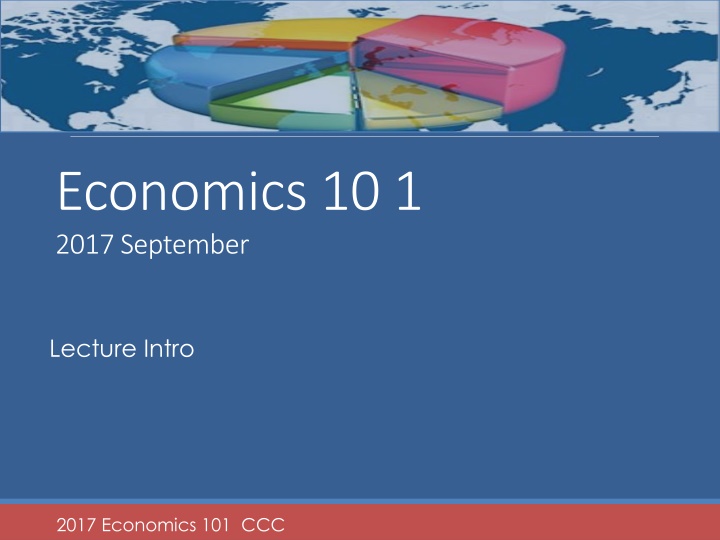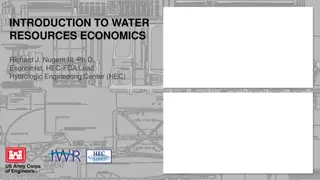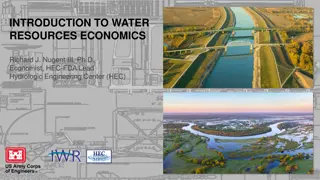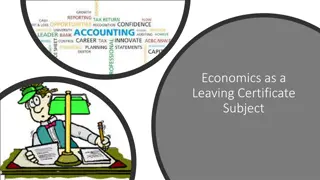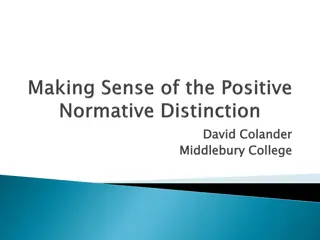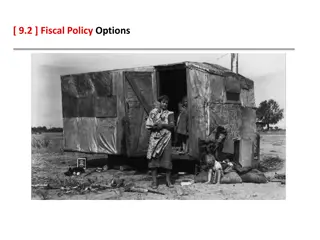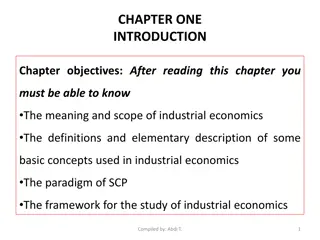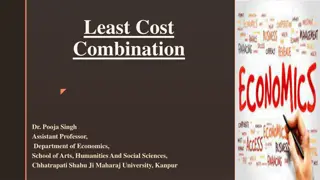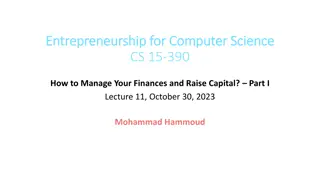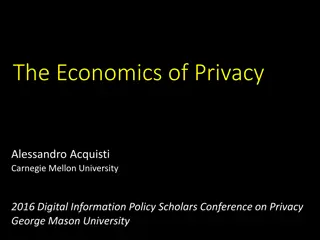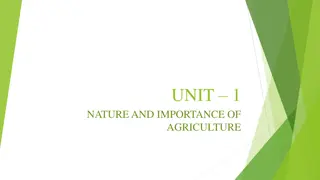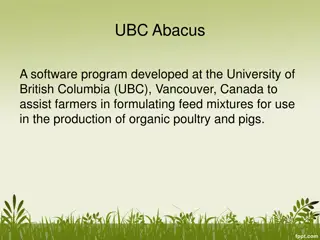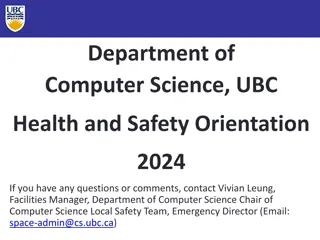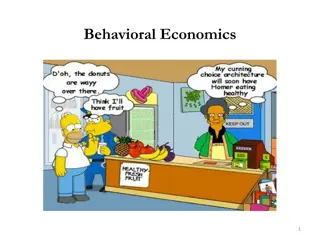Economics Lecture Series at UBC
Dive into the world of economics with Kelleen Wiseman, MBA, PhD, as she guides students through fundamental economic concepts and microeconomic theories in this comprehensive course. Explore market structures, pricing, the roles of free markets and government, and more. Utilize critical reasoning to analyze economic issues and enhance your understanding of the global economy.
Download Presentation

Please find below an Image/Link to download the presentation.
The content on the website is provided AS IS for your information and personal use only. It may not be sold, licensed, or shared on other websites without obtaining consent from the author.If you encounter any issues during the download, it is possible that the publisher has removed the file from their server.
You are allowed to download the files provided on this website for personal or commercial use, subject to the condition that they are used lawfully. All files are the property of their respective owners.
The content on the website is provided AS IS for your information and personal use only. It may not be sold, licensed, or shared on other websites without obtaining consent from the author.
E N D
Presentation Transcript
Economics 10 1 2017 September Lecture Intro 2017 Economics 101 CCC
Kelleen Wiseman, MBA, PhD The University of British Columbia Educational Background UBC Faculty Food & Resource Economics 15 years industry experience business sector Oracle Corporation Santa Clara Retail Management Institute Commercial Banking Business Planning & Development Consulting Private Consulting Business my own! Reasons for Teaching this Course 2
course description understand and interpret economic events in the world around you. 3
learning outcomes Describe and utilize the fundamental economic concepts and microeconomic theories of pricing, markets, supply, demand, trade, efficiency and equity. Analyze the economic behaviour of individuals and firms within an economy Describe the different market structures, production and costs Identify the key characteristics and consequences of monopoly, monopolistic competition and oligopoly Explain the general roles of the free market and government in the economy. Identify the relevance of economics in a changing world Identify and apply critical reasoning to economic issues Describe the basic jargon used to model microeconomic behaviour 4
course website Course Materials : Notes, Assignments, Solutions: http://blogs.ubc.ca/econ101klw/ Poll Everywhere In class polling activity: https://pollev.com/klwiseman This is a simple application that allows you to text short answer or answer multiple choice questions using mobile devices like phones or laptops. See instructions below to register for polleverywhere. 5
course textbooks Microeconomics: Canada in the Global Environment, 9th edition, Parkin & Bade Option 1: (Paperback) Textbook Option 2: (Looseleaf) Binder Ready Textbook Option3: e-text Course ID for MyEconLab and etext is wiseman03545 If you decide to purchase the eight edition, it is your responsibility to ensure you compare and accommodate for the differences between the editions. 6
practicalities Assignments 1, 2, 3 Calculators Class notes Schedule Epoll registration 8
math in econ Graphing, Slope positive or negative and value: Linear Supply and Demand Curves Equations, substitution and solve for X - Equilibrium Price and Quantity Percentage increase and decrease - Elasticity Area of a triangle & rectangle - Consumer Surplus & Producer Surplus in Linear Demand & Supply Curves Resources: http://blogs.ubc.ca/econ101klw/2016/08/24/math-for- economics/ 9
protocol Be on time for class. You are in a university course manage your time. It is very disruptive for the rest of the students and the professor if others enter the classroom late. Participation is important in this class, stay engaged during class and be prepared to answer questions! All students are expected to come to class having read the assigned readings and additional resources and be ready to engage in the materials. Attendance will be considered when assigning final grades. Lecturers present the course material in a structured and value- added manner and all activities/Epolls (12%) are provided in class. Therefore, it is important for you to attend class. 10
protocol Laptops are not necessary in the classroom unless for Epolls. If you must have a laptop in class, then manage your access to respect others and the instructor by focusing on the lecture. Cell phones should be accessed only for time tracking and Epoll. Texting in class is not respectful or professional! Do not enter and exit the classroom during the class. The class is one hour and twenty minutes long and you are expected to be in the class the entire time. 11
university vs high school Do what you want to do! Interesting courses Start up Workload Assignments no second chance Exams re-allocation
Economics Strives to understand how individuals and societies make decisions and seek to satisfy needs and wants within a context of scarcity of good or services. Involves social and financial goals .. Not just business focus! Analyzes and describes the production, distribution, and consumption of goods and services. Uses of frameworks and model to understand real life .. Predict Understand.. Intervene perhaps.
Is this a good example of economics? The park bench http://vimeo.com/1665301 16
What do you know about economics? Terms?? Concept? Decision making? 17
Economic concepts Decision making include consideration of : The Scarcity Problem: Boundless needs and wants, limited resources so that having more of one good thing usually means having less of another. Limited Resources refers to Land: includes minerals, water, fish, oxygen, natural resources Labour: mental and physical efforts Capital: real capital buildings, roads, manufacturing plants, equipment human capital training, health, skills, networks Entrepreneurship: organization of the above items 18
Economic concepts Choices: Every person, business, and government in the world must make choices concerning the use of limited resources. Rationality well defined goals & values Costs Explicit Opportunity cost: Next best alternative Everyone?? Bill Gates.. Mr. Buffet You ..today? Sunk cost: money already spent as a result of a past decision. Should be neglected in decision making Marginal cost: cost of one additional activity/product 19
Economic concepts Models Supply Demand Incentives Pricing And a few others 20
We study Economics to Understand the economy and society Free markets and how they work or why they do not work Recessions, Expansions & how to influence them Why are their OPEC cartels and stock markets? How exactly do trade agreements like NAFTA and border duty regulations work? And why are they in place?
We study Economics to Understand world affairs Global economic stability EU, Greece & the rest of us? Canadian Elections recessions - oil prices - exchange rates Syria refugees - migration - Arab Spring how does this affect Canada? Understand Market Pricing Supply Demand Risk
We study Economics to Become a well-informed citizen Interest rates and bank loans Deficits, unemployment and government Supply Demand Business & Risk Think logically Specific way of thinking and making decisions Ex: cost vs benefits Scarcity and Making Choices
Carbon tax 24
Why does the airplane company charge different rates for different seat? Is that fair?
Why do people buy potato chips when they are on sale but not potatoes?
Is the difference between the rich and poor getting better or worse? In the US, the richest 1% of the country owns a third of the country's assets and the poorer 50% owns less than 2.5%.
Economics is a method rather than a doctrine, an apparatus of the mind, a technique of thinking which helps its possessor to draw correct conclusions. John Maynard Keynes (1883 1946)
Economics has two broad branches: Microeconomics the firm and individual level Macroeconomics the whole economy level
ECONOMIC DEVELOPMENT INDUSTRIAL ORGANIZATION BEHAVIOURAL BEHAVIOURAL ECONOMICS ECONOMICS LABOUR LABOUR HEALTH ECONOMICS HEALTH ECONOMICS ECONOMETRICS ECONOMETRICS POLICY TAX.. POLICY TAX.. EDUCATION.. EDUCATION.. SUBSIDIES SUBSIDIES TRADE TRADE FINANCIAL & MONETARY FINANCIAL & MONETARY POLICY POLICY FOOD & RESOURCE FOOD & RESOURCE ECONOMICS ECONOMICS
Microeconomics Study of how people and firms make decisions regarding the allocation of resources and prices of goods and services. Focuses on supply and demand and other forces that determine the price levels seen in the economy
THINKING LIKE AN ECONOMIST MEANS . Viewing problems and scenarios using economic frameworks and principles Giving a better understanding of the problems Giving a range of the potential solutions from various perspectives
How will you train yourself to think like an Economist? Read the textbook chapter before class it is only 20 pages. Be clear about the objective and concept of the chapter when you come to class Print out the notes from the web, bring the notes to class and take additional notes in class (see handout) Make notes of class discussion/questions and content that the professor says is important ( you will not remember when it comes time to study!)
How will you train yourself to think like an Economist? Use the assignments as a way to work through the materials & get practice for the exam.. Not something to just get done Work through the questions at the end of the chapters and Connect Work through the textbook in-chapter examples and exercises Learn, Use & Depend on the frameworks, terminology, graphs, and equations to analyze the problems and questions..
Next week Chapter 1, 2, 3 Notes Consider you strategy! 43
